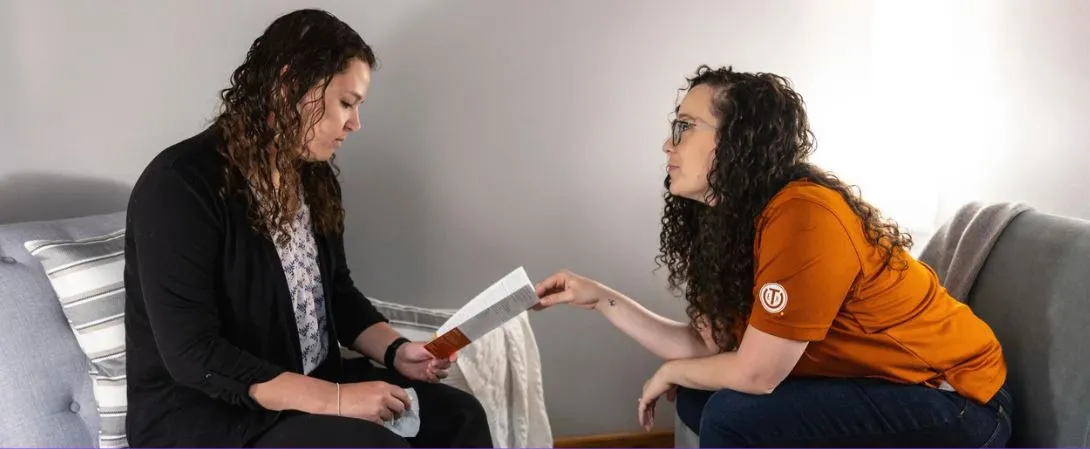
Step 1: Seeking Help
Request an appointment here.
When you request an appointment, someone will reach out to you within 2 business days via your preferred method of contact to schedule an intake appointment. They will offer times an advocate is available and you can pick what works best for you. There is no police accompaniment involved in this appointment unless requested.
*VAN staff and advocates are mandatory Title IX reporters for staff and faculty. Mandatory reporting as required by the State of Texas applies to concerns of neglect or abuse of a child, elderly person, or individual with a disability.
*If you are experiencing a mental health emergency, please call the UT's 24-hour Counseling & Mental Health Center's Crisis Line: 512-471-CALL (2255), Travis County Integral Care's 24/hour Mobile Crisis Outreach Team at 512-472-HELP (4357), National Mental Health Crisis & Suicide Hotline "988", or 911 for immediate police assistance.
Step 2: Email Confirmation
The advocate you will be meeting with will send you an email confirmation of your appointment type (in-person, on phone, or zoom,) and date/time.
Step 3: A Private Talk
You and your advocate will talk about the impacts of your concern on your safety, wellness, and functioning, and help you make a plan for how you can move forward with support and healing.
Step 4: We'll Explore Options
We will never tell you what to do. Rather, we will explore all of the options and resources available to you so that you can feel empowered to make the decisions that work best for you.
Services We Provide
Victim-Survivor Advocates provide free, confidential, and trauma-informed support services to students, faculty, and staff who have experienced or witnessed interpersonal violence (i.e. domestic and dating violence, sexual assault and rape, sexual harassment, stalking, etc.), various crimes, and distressing events (witnessing psychiatric or medical emergencies, receiving threats, etc.).
We believe in empowering you to make informed decisions around your healing and justice. We will assist you in navigating any resources, processes, and/or services that feel relevant and helpful to you.
Information
Learning about how trauma impacts your wellness can be very empowering for survivors. Our advocates are trained trauma professionals and can help you understand how it may be impacting your mind, body, and spirit.
Trauma:
- Impact of Trauma
- How to manage trauma
- 4 important ways to heal trauma
- How to support someone who has experienced trauma
Intimate Partner Violence:
Stalking:
- Stalking Incident And Behavior Log
- Stalking Safety Strategies
- Stalking Among College Students: Fact Sheet
Assessments & Safety Planning:
Our staff are trained to use valid and reliable assessment tools to measure danger and risk in domestic violence and stalking situations. These tools help inform our efforts in customizing safety plans for our clients.
- A College Student’s Guide to Safety Planning
- Interactive Guide to Safety Planning
- TDCJ Personal Safety Plan
- Cyber safety
Support for Reporting & Navigating Systems
Our advocates can help you explore what reporting to the police or the University of Texas at Austin Title IX office could look like. If you decide you'd like to report, your advocate will be with you throughout any University, criminal and/or civil processes to answer questions, advocate for you, and provide support.
If you are interested in speaking to a police officer about your options and concerns, our advocates are trained to provide accompaniment.
A Private Place to Talk

One aspect of a "trauma-informed" response is considering the service-delivery environment for individuals who may spend several hours recounting their most traumatic experience in detail. For survivors of sexual assault, intimate partner violence, and other distressing events, offering a space to speak with an advocate and/or officer that is more similar to a cozy living room than a suspect interview room can make a great difference in the long-term impact and re-traumatization of that experience. With changes to softer lighting and colors, cozy chairs, pillows and blankets, décor pieces, empowering signage, and a variety of stress-relief tools, this space is now much more supportive for survivors to share their difficult stories.
Academic Support for Students
Trauma and safety issues can have a huge impact on a survivor's capacity to learn, focus, remember, communicate and feel safe and comfortable at school. Our advocates can connect students to our partners at Student Emergency Services, who can assist with identifying impacts and helping navigate any communication or processes needed to succeed in school.
Employment Support for Employees
Trauma and safety issues can have a huge impact on any area of your life. Our advocates can connect University employees to UT's Employee Assistance Program, which can assist with identifying impacts and helping navigate any communication or processes needed at work and in your personal life.
Medical and Mental Health Referrals
Our advocates have a network of mental health and medical professionals on campus and in the community and can get you connected.
Campus and Community Resources
Our advocates are a hub for resources and services on campus and in the community that can be helpful as survivors move forward with wellness, healing and justice. You can ask an advocate any question and if we can't help you, we'll get you somewhere that can!
